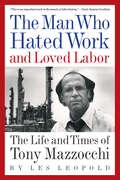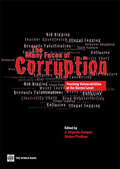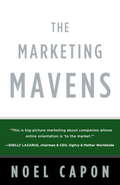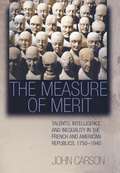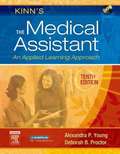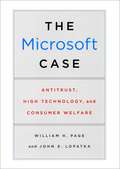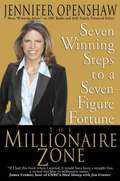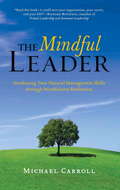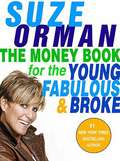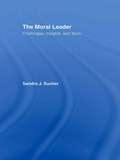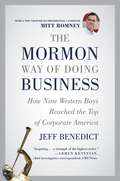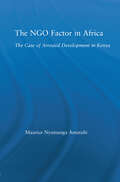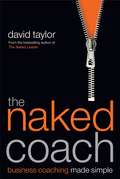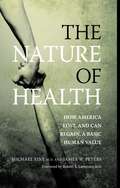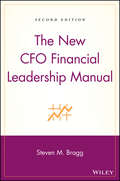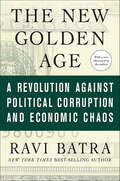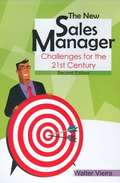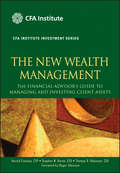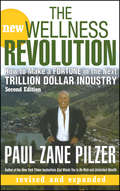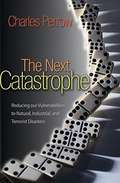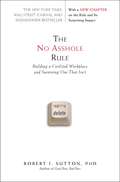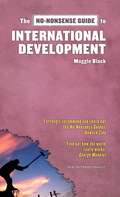- Table View
- List View
The Man Who Hated Work and Loved Labor: The Life and Times of Tony Mazzocchi
by Les LeopoldA CIA-connected labor union, an assassination attempt, a mysterious car crash, listening devices, and stolen documents--everything you'd expect from the latest thriller. Yet, this was the reality of Tony Mazzocchi, the Rachel Carson of the U.S. workplace; a dynamic labor leader whose legacy lives on in today's workplaces and ongoing alliances between labor activists and environmentalists, and those who believe in the promise of America.In The Man Who Hated Work and Loved Labor: The Life and Times of Tony Mazzocchi, author and labor expert Les Leopold recounts the life of the late Oil, Chemical, and Atomic Workers Union leader. Mazzocchi's struggle to address the unconscionable toxic exposure of tens of thousands of workers led to the passage of the Occupational Safety and Health Act and included work alongside nuclear whistleblower Karen Silkwood. His noble, high-profile efforts forever changed working conditions in American industry--and made him enemy number one to a powerful few.As early as the 1950s, when the term "environment" was nowhere on the political radar, Mazzocchi learned about nuclear fallout and began integrating environmental concerns into his critique of capitalism and his union work. An early believer in global warming, he believed that the struggle of capital against nature was the irreconcilable contradiction that would force systemic change.Mazzocchi's story of non-stop activism parallels the rise and fall of industrial unionism. From his roots in a pro-FDR, immigrant family in Bensonhurst, Brooklyn, through McCarthyism, the Sixties, and the surge of the environmental movement, Mazzocchi took on Corporate America, the labor establishment and a complacent Democratic Party.This profound biography should be required reading for those who believe in taking risks and making the world a better place. While Mazzocchi's story is so full of peril and deception that it seems almost a work of fiction, Leopold proves that the most provocative and lasting stories in life are those of real people.
The Many Faces of Corruption: Tracking Vulnerabilities at the Sector Level
by J. Edgardo Campos Sanjay PradhanCorruption... How can policymakers and practitioners better comprehend the many forms and shapes that this social pandemic takes? From the delivery of essential drugs, the reduction in teacher absenteeism, the containment of illegal logging, the construction of roads, the provision of water and electricity, the international trade in oil and gas, the conduct of public budgeting and procurement, and the management of public revenues, corruption shows its many faces. 'The Many Faces of Corruption' attempts to bring greater clarity to the often murky manifestations of this virulent and debilitating social disease. It explores the use of prototype road maps to identify corruption vulnerabilities, suggests corresponding 'warning signals,' and proposes operationally useful remedial measures in each of several selected sectors and for a selected sample of cross cutting public sector functions that are particularly prone to corruption and that are critical to sector performance. Numerous technical experts have come together in this effort to develop an operationally useful approach to diagnosing and tackling corruption. 'The Many Faces of Corruption' is an invaluable reference for policymakers, practitioners, and researchers engaged in the business of development.
The Marketing Mavens
by Noel CaponThe way far too many people at far too many companies think about and execute marketing was born in an era when suppliers-the companies generating products and services-were in the catbird seat. That world is long dead, and customers now occupy that position. In this relentlessly globalizing economy, we live in a world of oversupply and underdemand, with too many suppliers chasing too few customers, offering more goods and services than the market can absorb. Noel Capon set out to discover what differentiates people who know how to succeed in this changed world-people who are able to create customers for the products and services of their business. The Marketing Mavens is based on a four-year-long research program that spanned twenty-five industries, identifying long-term winners and what they do differently. Put simply, Marketing Mavens place customers at the center of their business and make marketing everyone’s job. Using a wide variety of intriguing, in-depth examples, from ESPN to the Mayo Clinic, Dr. Capon shows how the mavens create customers. How by placing the sports fan at the center of its business, ESPN creates programming that meets the needs of fans that were never given a second thought by the networks; or how physicians at the Mayo Clinic, being both technical experts and skilled at creating a patient-centric ambience, motivate people to pay the extra travel and lodging expenses not covered by insurance. Marketing Mavens, though a rare breed, can be found up and down an organization-from the CEO to chief marketing officers to business unit managers. Noel Capon has talked to mavens from across the global economy and brings forth their uncanny insights behind the five imperatives of the true Marketing Maven: ¥ Picking markets that matter ¥ Selecting segments to dominate and finding the sweet spot in that segment ¥ Designing the offer to create customer value and secure differential advantage ¥ Integrating to serve the customer ¥ And measuring what matters Noel Capon in The Marketing Mavens redefines marketing, moving it from a focus on selling and communication into a discipline that guides all the key decisions of a business. By seeing marketing as everyone’s business-not the domain of a few specialists-you’ll get your business in step with the way the world really works . . . and start creating customers. Next year’s profits don’t depend on next year’s numbers but on next year’s customers. The Marketing Mavens points the way to those customers, profits, and an increased stock price. From the Hardcover edition.
The Measure of Merit: Talents, Intelligence, and Inequality in the French and American Republics, 1750-1940
by John CarsonCarson tells the fascinating story of how two nations wrestled scientifically with human inequalities and their social and political implications. Surveying an array of political tracts, philosophical treatises, scientific works, and journalistic writings, he chronicles the gradual embrace of the IQ version of intelligence in the U.S., while in France, the birthplace of the modern intelligence test, expert judgment was consistently prized above such quantitative measures.
The Medical Assistant: An Applied Learning Approach
by Alexandra Patricia Young Deborah B. ProctorFor this tenth edition of a text/CD-ROM package, Young (Everest College-Arlington Midcities) and Proctor (director, medical assisting program, Butler County Community College) incorporate an approach that is reflected in the book's subtitle: an applied learning approach. There is new information on procedures for managing an office, and new material on how the HIPAA Privacy Rule benefits the healthcare industry and the patient. Also new to this edition is the integration of administrative concepts into discussions on the various diseases and conditions within each medical specialty. This feature is intended to transcend the traditional separation of administrative and clinical topics. Each clinical specialty chapter has been revised, with expanded focus on medical terminology, anatomy and physiology, and pathophysiology. The CD-ROM contains scenarios and questions, anatomy and physiology animations, and a demo derived from a medical office software program, allowing students to practice front office skills. Annotation ©2008 Book News, Inc. , Portland, OR (booknews. com)
The Microsoft Case: Antitrust, High Technology, and Consumer Welfare
by William H. Page John E. LopatkaIn 1998, the United States Department of Justice and state antitrust agencies charged that Microsoft was monopolizing the market for personal computer operating systems. More than ten years later, the case is still the defining antitrust litigation of our era. William H. Page and John E. Lopatka’s The Microsoft Case contributes to the debate over the future of antitrust policy by examining the implications of the litigation from the perspective of consumer welfare. The authors trace the development of the case from its conceptual origins through the trial and the key decisions on both liability and remedies. They argue that, at critical points, the legal system failed consumers by overrating government’s ability to influence outcomes in a dynamic market. This ambitious book is essential reading for business, law, and economics scholars as well as anyone else interested in the ways that technology, economics, and antitrust law have interacted in the digital age. “This book will become the gold standard for analysis of the monopolization cases against Microsoft. . . . No serious student of law or economic policy should go without reading it.”—Thomas C. Arthur, Emory University
The Millionaire Zone: Seven Winning Steps to a Seven-Figure Fortune
by Jennifer OpenshawWhen it comes to making a change in our lives, there is nothing more frightening than taking a financial risk--starting your own business, investing money, or making a career change.Not anymore.Now you can achieve your financial dreams without having to go it alone. By showing you how to stay in your comfort zone, nationally recognized financial expert Jennifer Openshaw eliminates the roadblocks between you and your financial rewards. This book will help you make the change you've always thought about but were too afraid to try.With Jennifer's straightforward, simple approach, youll leave behind all the excuses that hold so many of us back from making the changes necessary to achieve our financial goals. You'll learn how to use what's already at your fingertips--the people, places, and opportunities closest to you--to make money. Along with her seven winning strategies unlocking the secrets to your first million, she includes advice on: $ How to make people want to help you$ Three powerful ways to turn a "No" into a "Yes" $ How to connect with top decision-makers$ How to create your own advisory board$ Dealing with debt--and more$ Turning your passions into profitsJennifer will also inspire you with the stories of how some of America's wealthiest people got where they are today by applying the principles at the heart of this book. Plus, in these pages you'll find groundbreaking research based on surveys and interviews with over 3,000 Americans on how they used familiar things to research financial security.To get you on the path to bigger and better things, Jennifer includes a Millionaire Zone Profile assessment with this book plus a 30-Day Getting Started Program to turn your passions into profits.The Millionaire Zone will not only change your life but the way you operate in the world. Whether you're an employee, investor, or entrepreneur, you'll discover what other "Zoners" already know: That surrounding yourself with familiar things--what Jennifer calls your LifeNet--will empower you to overcome your fears and move your financial life from neutral to high-gear.Thousands of people have reached the Millionaire Zone using Jennifer's winning strategies. Now it's your turn!
The Mindful Leader: Awakening Your Natural Management Skills Through Mindfulness Meditation
by Michael CarrollA new generation of business leaders is turning to mindfulness as a cutting-edge leadership tool. Scientific research suggests that the practice of mindfulness (a technique for learning to live in the present moment) can help individuals to gain clarity, reduce stress, optimize performance, and develop a greater sense of well-being.In The Mindful Leader, Michael Carroll explains what mindfulness is and how to develop it in the hectic and often stressful environment of the twenty-first century workplace. He focuses on ten key principles of mindfulness and how they apply to leading groups and organizations. Along the way, Carroll addresses a range of topics, including how to:heal the "toxic workplace," where anxiety and stress impede performancecultivate courage and confidence in the face of workplace difficultiespursue organizational goals without neglecting what's happening here and nowlead with wisdom and gentleness, not just with ambition and powerstart a personal meditation practice to develop your innate leadership talentsFull of engaging stories and practical exercises, The Mindful Leader will help leaders in any field to discover their innate intelligence, bravery, and joy on the job.
The Money Book for the Young, Fabulous & Broke
by Suze Orman<p>The New York Times bestselling financial guide aimed squarely at "Generation Debt"—and their parents—from the country's most trusted and dynamic source on money matters. <p><i>The Money Book for the Young, Fabulous & Broke</i> is financial expert Suze Orman's answer to a generation's cry for help. They're called "Generation Debt" and "Generation Broke" by the media — people in their twenties and thirties who graduate college with a mountain of student loan debt and are stuck with one of the weakest job markets in recent history. The goals of their parents' generation — buy a house, support a family, send kids to college, retire in style — seem absurdly, depressingly out of reach. They live off their credit cards, may or may not have health insurance, and come up so far short at the end of the month that the idea of saving money is a joke. This generation has it tough, without a doubt, but they're also painfully aware of the urgent need to take matters into their own hands. <p><i>The Money Book</i> was written to address the specific financial reality that faces young people today and offers a set of real, not impossible solutions to the problems at hand and the problems ahead. Concisely, pragmatically, and without a whiff of condescension, Suze Orman tells her young, fabulous & broke readers precisely what actions to take and why. Throughout these pages, there are icons that direct readers to a special YF&B domain on Suze's website that offers more specialized information, forms, and interactive tools that further customize the information in the book. Her advice at times bucks conventional wisdom (did she just say use your credit card?) and may even seem counter-intuitive (pay into a retirement fund even though your credit card debt is killing you?), but it's her honesty, understanding, and uncanny ability to anticipate the needs of her readers that has made her the most trusted financial expert of her day. <p>Over the course of ten chapters that can be consulted methodically, step-by-step or on a strictly need-to-know basis, Suze takes the reader past broke to a secure place where they'll never have to worry about revisiting broke again. And she begins the journey with a bit of overwhelmingly good news (yes, there really is good news): Young people have the greatest asset of all on their side — time.</p>
The Moral Leader: Challenges, Tools and Insights
by Sandra J. SucherSuccessful leaders – at any level and in any arena – are inevitably presented with moral and ethical choices. This unique and innovative textbook is designed to encourage students and managers to confront those fundamental moral challenges, to develop skills in moral analysis and judgment, and to come to terms with their own definition of moral leadership and how it can be translated into action. Drawing on the inspiration of major literary and historical figures such as Machiavelli, Conrad, Shackleton and Achebe, and based upon an impressive array of literary sources, including novels, plays, history and biography, the book centers on four questions implicitly asked of all leaders: What is the nature of a moral challenge? How do people 'reason morally'? How do leaders contend with the moral choices they face? How is moral leadership different from leadership in general? The Moral Leader is based upon the renowned course of the same name taught at Harvard Business School for over two decades. With an emphasis on decision-making and action, students learn to identify moral problems, to address them systematically, and to develop skills that aid them throughout their studies and their professional lives. At times challenging, insightful, and always illuminating, this book is essential reading for all serious students of leadership, management, business ethics or policy. Visit the companion website at www.routledge.com/textbooks/9780415400640
The Mormon Way of Doing Business: How Nine Western Boys Reached the Top of Corporate America
by Jeff BenedictThe Founder of JetBlue. The former CEO of Dell Computers. The CEO of Deloitte & Touche. The former Dean of the Harvard Business School. They all have one thing in common. They are devout Mormons who spend their Sundays exclusively with their families, never work long hours, and always put their spouses and children first. How do they do it? Critically acclaimed author and investigative journalist Jeff Benedict (a Mormon himself) examines these highly successful business execs and discovers how their beliefs have influenced them, and enabled them to achieve incredible success.With original interviews and unparalleled access, Benedict shares what truly drives these individuals, and the invaluable life lessons from which anyone can benefit.
The Myth of the Robber Barons: A New Look at the Rise of Big Business in America (5th edition)
by Burton W. FolsomA new look at the Rise of Big Businesses in America.This book is a new look at entrepreneurs and government and the role of both in the rise of big business. It is a study of four industries--steamships, railroads, steel, and oil--and of the people who pushed the United States into world leadership in these industries.
The NGO Factor in Africa: The Case of Arrested Development in Kenya (African Studies)
by Maurice N. AmutabiThe book breaks new ground in understanding the role of Non-Governmental Organizations (NGOs) in Africa. The book historicizes NGOs using the Rockefeller Foundation as a case study, looking at its tripartite paradoxical roles as an agent of colonialism, globalization and development/underdevelopment. It deploys interdisciplinary devices to show how the RF projects have engaged in marginalization, patronage and ‘othering’ of African values and customs and the ensuing controversies. Using globalization, postmodern and postcolonial theories the book deconstructs the long-held myths about NGO inviolability, and opens ground for understanding their strengths. It interrogates sites of contestation, apprehension and possibilities that the RF has produced. Using RF projects, it looks at structures of hegemony, race, power, class and gender that the RF has created. The book illustrates the extent to which the RF has been instrumental in spreading capitalism, imperialism in economic, political, cultural and social realms through globalization. It desists from the grand narrative approach that has dominated African history in the past but instead gives agency and voice to those that have previously been marginalized.
The Naked Coach: Business Coaching Made Simple
by David TaylorBestselling author David Taylor returns with his take on business coaching. No fuss. No jargon. Just great ideas. The Naked Coach is the back-to-basics book on coaching that will make sense of coaching and place it back at the very heart of the business agenda. It will make understanding, learning and teaching coaching simple. The Naked Coach tells real, practical, fun, exciting and above all else relevant stories that you can apply straightaway. David Taylor strips away the hype, jargon and mystery to give coaching a clear definition in all its forms, including mentoring, training, facilitation and interventions of every kind. The Naked Coach explains coaching without being patronising, defines without being arrogant, and does it in a fun, accessible way. It is coaching from a different perspective - yours. The fundamental principle of The Naked Coach is to be yourself - always. Find what works for you, and do it, again and again and again. Remember. No fuss. No Jargon. Just great ideas.
The Nature of Health: How America Lost, and Can Regain, a Basic Human Value
by James Peters Michael FineThis pioneering work addresses a key issue that confronts all industrialised nations: How do we organise healthcare services in accordance with fundamental human rights, whilst competing with scientific and technological advances, powerful commercial interests and widespread public ignorance? "The Nature of Health" presents a coherent, affordable and logical way to build a healthcare system. It argues against a health system fixated on the pursuit of longevity and suggests an alternative where the ability of an individual to function in worthwhile relationships is a better, more human goal. By reviewing the etymology, sociology and anthropology of health, this controversial guide examines the meaning of health, and proves how a community-centred healthcare system improves local economy, creates social capital and is affordable, rational, personal, and just. "This is badly needed nourishment for a medical system glutted on technology, individualism, profit and the pursuit of longevity. Read and be fed." - Christopher Koller, Health Insurance Commissioner, The State of Rhode Island, USA. "Unique. Surprising. A real eye-opener. Just about everyone who doesn't have a vested financial interest in maintaining the status quo will agree that U.S. healthcare is badly broken. [This book] is making it possible for us to refocus from how to provide healthcare to how to achieve health. Their description of health as successful functioning in community, rather than as a measure of longevity is a definition that can make a reader feel healthier as they take gradually appreciate the power of the concept. On this foundation, it is not as hard as one might think to outline a healthcare system that is equitable, affordable and achievable." - Alexander Blount EdD, Professor of Family Medicine, University of Massacusetts Medical Center.
The New CFO Financial Leadership Manual
by Steven M. BraggFilled with pragmatic insights, proactive strategies, and best practices, The New CFO Financial Leadership Manual, Second Edition is destined to become your essential desktop companion. This thorough guidebook is essential reading for the CFO requiring an overview of strategies, measurement and control systems, financial analysis tools, funding sources, and management improvement tips.
The New Golden Age: The Coming Revolution against Political Corruption and Economic Chaos
by Ravi BatraIn The New Golden Age, bestselling author and economist Ravi Batra identifies the roadblocks to economic prosperity--and what we need to do to overcome them. Bringing the same insight and expertise that made books like The Downfall of Capitalism and Communism international bestsellers, Batra takes on falling minimum wages, corporate scandals, rocketing oil prices, and many of the other crises facing the world economy. He also offers an expansive, optimistic vision of how the international community can address them and bring about something historically unprecedented: true global economic prosperity.
The New Sales Manager
by Walter VieiraThe second edition of The New Sales Manager is an enormously useful book that provides practical advice and a sound foundation in sales management to young managers. It is also an interesting, quick revision for senior sales managers who want to revisit the theory of sales management, in a painless, and perhaps, entertaining way. Covering the entire range of functions of a sales manager, the book has been thoroughly revised and includes plenty of illustrations, Real-life anecdotes and caselets to match the changes in the business environment.
The New Wealth Management
by Thomas R. Robinson Harold Evensky Cfp Stephen M. Horan Roger IbbotsonMainstay reference guide for wealth management, newly updated for today's investment landscapeFor over a decade, The New Wealth Management: The Financial Advisor's Guide to Managing and Investing Client Assets has provided financial planners with detailed, step-by-step guidance on developing an optimal asset allocation policy for their clients. And, it did so without resorting to simplistic model portfolios, such as lifecycle models or black box solutions. Today, while The New Wealth Management still provides a thorough background on investment theories, and includes many ready to use client presentations and questionnaires, the guide is newly updated to meet twenty-first century investment challenges. The bookIncludes expert updates from Chartered Financial Analyst (CFA) Institute, in addition to the core text of 1997's first edition - endorsed by investment luminaries Charles Schwab and John BoglePresents an approach that places achieving client objectives ahead of investment vehiclesApplicable for self-study or classroom useNow, as in 1997, The New Wealth Management effectively blends investment theory and real world applications. And in today's new investment landscaped, this update to the classic reference is more important than ever.
The New Wellness Revolution: How to Make a Fortune in the Next Trillion Dollar Industry
by Paul Zane PilzerRead the Preface, Introduction, and Chapter 1 at thewellnessrevolution.paulzanepilzer.com. Five years ago, Paul Zane Pilzer outlined the future of an industry he called “wellness” and showed readers how they could get in on the profitable bottom floor. The New Wellness Revolution, Second Edition includes more guidance and business advice for entrepreneurs, product distributors, physicians, and other wellness professionals. It’s an industry that will only grow, so get in while you can.
The Next Advantage for Manufacturing: Winning in China
by Jonathan Woetzel Jimmy HexterAs competition intensifies in China's new markets, pressures will mount on companies to improve their execution in every aspect of manufacturing. This chapter looks at how some companies have successfully tailored operations to the local realities of China.
The Next Catastrophe: Reducing Our Vulnerabilities to Natural, Industrial, and Terrorist Disasters
by Charles PerrowCharles Perrow is famous worldwide for his ideas about normal accidents, the notion that multiple and unexpected failures--catastrophes waiting to happen--are built into our society's complex systems. In The Next Catastrophe, he offers crucial insights into how to make us safer, proposing a bold new way of thinking about disaster preparedness. Perrow argues that rather than laying exclusive emphasis on protecting targets, we should reduce their size to minimize damage and diminish their attractiveness to terrorists. He focuses on three causes of disaster--natural, organizational, and deliberate--and shows that our best hope lies in the deconcentration of high-risk populations, corporate power, and critical infrastructures such as electric energy, computer systems, and the chemical and food industries. Perrow reveals how the threat of catastrophe is on the rise, whether from terrorism, natural disasters, or industrial accidents. Along the way, he gives us the first comprehensive history of FEMA and the Department of Homeland Security and examines why these agencies are so ill equipped to protect us. The Next Catastrophe is a penetrating reassessment of the very real dangers we face today and what we must do to confront them. Written in a highly accessible style by a renowned systems-behavior expert, this book is essential reading for the twenty-first century. The events of September 11 and Hurricane Katrina--and the devastating human toll they wrought--were only the beginning. When the next big disaster comes, will we be ready?
The No Asshole Rule: Building a Civilized Workplace and Surviving One That Isn't
by Robert I. SuttonWhen the Harvard Business Review asked Robert Sutton for suggestions for its annual list of Breakthrough Ideas, he told them that the best business practice he knew of was 'the no asshole rule'. Sutton's piece became one of the most popular articles ever to appear in the HBR. Spurred on by the fear and despair that people expressed, the tricks they used to survive with dignity in asshole-infested places, the revenge stories that made him laugh out loud and the other small wins that they celebrated against mean-spirited people, Sutton was persuaded to write THE NOASSHOLE RULE. He believes passionately that civilised workplaces are not a naive dream, that they do exist, do bolster performance and that widespread contempt can be erased and replaced with mutual respect when a team or organisation is managed right. There is a huge temptation by executives and those in positions of authority to overlook this trait especially when exhibited by so-called producers, but Sutton shows how overall productivity suffers when the workplace is subjected to this kind of stress.
The No-Nonsense Guide to International Development
by Maggie Black"Overseas aid" and "international development" are catch-all terms that cover a multitude of activities--and abuses. This guide explains what "development" actually is--and explores its political and economic roots. It shows what can happen in the name of development and argues for a more organic, social approach with those it seeks to serve as equal partners in the process. Maggie Black has written books for the Oxford University Press, UNICEF, and Oxfam. She has worked as a consultant for UNICEF, Anti-Slavery International, and WaterAid, among others, and has written for the Guardian, The Economist, and BBC World Service.
The Nontraditional Is the New Traditional: Six Trends that have Created a New Workforce Imperative
by Cathleen Benko Anne WeisbergWhy is here and now the time to acknowledge and respond to the notion that corporate structures are morphing from a ladder to a lattice construct? One reason is that six key trends are converging in ways that create an unprecedented workforce challenge for business executives. This convergence is creating sweeping changes in workforce composition, attitudes, and capabilities. This chapter dissects the six trends and illustrates how each is exacerbating the friction between workforce challenges and structural workplace impediments. This chapter is excerpted from "Mass Career Customization: Aligning the Workplace with Today's Nontraditional Workforce."
